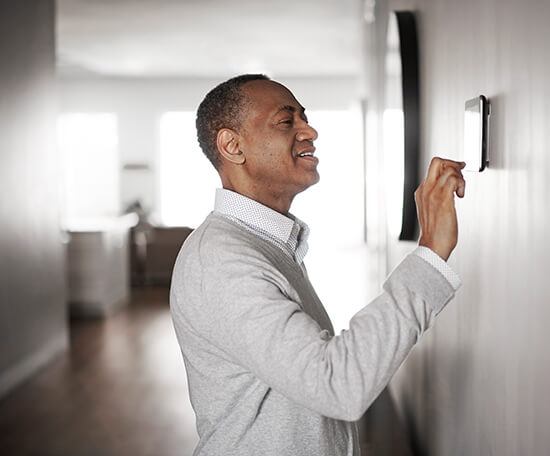
You might be considering closing vents upstairs to try and save on your bills. Conventional wisdom dictates that shutting vents in unused spaces will only redirect the air to the used living spaces. As a result, you could improve energy efficiency and save cost. But how true is the statement?
In reality, shutting vents actually cause you more problems than it helps. Read on to learn why the experts recommend against shutting vents upstairs. We will also provide you with alternative solutions to ensure maximum home comfort.
It Decreases Efficiency
During the installation of heating and cooling systems, the climatic conditions and the square footage of your home determine the size of your HVAC system. A larger HVAC system than required has short heating/cooling cycles, which damage the motor. On the other hand, a smaller one will run longer and overwork, eventually damaging it. Your system uses the same energy even if you close vents upstairs.
Understanding how the HVAC system works will help show how closing the vents offsets the efficiencies of your appliance. The blowers draw air from your home through the return ducts for cooling or heating. They then return to your home via supply ducts.
Generally, the blowers contain either a permanent split capacitor (PSC) or electronic commutated motors (ECM). Shutting the vents adds air pressure to the ducts, making the motors work harder. The ECM motor attempts to increase its capacity to adjust to the new conditions.
Consequently, this action makes the motor use more energy. On the contrary, high air pressure slows the functionality of the PSC and pushes little or no air. The result is higher energy bills with minimum or no conditioned air.
When you shut the registers, you deter the airflow and push more air to desired rooms than the system can handle. This action overworks the HVAC unit and makes it run for longer when trying to correct the temperature differences. Consequently, overworking your system for prolonged hours uses more energy and damages the machine faster. More energy and premature death of your system will cost you more.
Temperature Imbalance
While the blowers help push the air into your home, the dampers regulate how much air goes into a particular space. In a normal setting, the blower pushes air from the closest to the furthest room to achieve even temperatures.
A push to the levers for closing the registers upstairs makes the damper rotate and block airflow in the ducts. The airflow disruption builds up pressure in the ducts, causing more air to flow in rooms closer to the blower. Consequently, it causes the room temperature to rise or drop sharply in those spaces based on the thermostat setting.
Insufficient airflow volume makes the upper rooms with closed registers have lower temperatures than other rooms. Moreover, it leads to air leakages from outside, further interfering with the temperatures.
System Damage
The HVAC system relies on air pressure to push air between the ducts and your home. However, disrupting the airflow circulation may cause various damages to your system. Here are components that will break down as a consequence of shutting the registers:
Ducts – The increase in air pressure within the ducts pushes against the ductwork looking for an escape route. If the ducts have a crack or hole, the push against the weak point causes it to enlarge further. As a result, you will have more energy loss to the environment. Damaged ductwork requires the repair expertise of a professional.
Heat Exchanger – The heat exchanger’s primary purpose is to transfer thermal energy from one medium to the other. Closed vents make this component overheat and crack.
Compressor – The compressor or evaporator coils are useful in cooling your home and regulating humidity. Shutting your vents can cause pressure issues, leading to your coils freezing.
Unfortunately, most singular components of the HVAC units have no warranties. A malfunction requires immediate repair or replacement to restore usual operations.
Exposure to Carbon Monoxide
Carbon monoxide is an odorless, tasteless, and colorless lethal gas. When inhaled, it replaces oxygen composition in the body, leading to dire symptoms or death. For this reason, we strongly recommend installing a carbon monoxide detector and ensuring it is functional.
Closing the registers reduces the amount of air flowing to your furnace’s heat exchanger. As a result, there is inadequate fuel combustion, making the exchanger overheat or crack. The behavior leads to the formation of carbon monoxide, which flows through the ducts to your home.
You may notice lightheadedness, confusion, blurred vision, breathing difficulties, or fatigue. Ensure you immediately open your windows and shut off the furnace.
Mold Problems
Closing the vents makes the temperature drop in spaces upstairs, leading to condensation of moisture in the rooms. Moisture content and low temperatures are ideal breeding grounds for mold. Sooner or later, the rooms will become musty due to mold presence.
It is possible to control mold within the house through cleaning and proper aeration. However, when the mold gets to the ductwork, you will need a professional to help you get rid of it. The main reason mold becomes a nuisance in the ducts is that dirt and moisture help it spread rapidly.
What Should I Do?
Rather than closing vents upstairs, consider installing a zoning system. The system allows you to direct more air to the required rooms, which helps to reduce energy consumption. Also, instead of completely shutting down the registers, consider partial closing. This action will help you attain better temperature and energy control in your home.
North Valley residents call Gallagher’s Plumbing, Heating and Air for all HVAC installations, repairs, and maintenance services. We also offer plumbing solutions and ductwork services. For more information, visit our website or give us a call today.

